You read the words on your phone, eyes quickening over an argument you’ve grown tired of. There it is; someone with an asinine take on the internet. It sits there, floating in cyberspace, mocking those scrolling past. It’s the bait, the cheese on the mouse trap. It’s so close, so easy to defeat in the arena of public opinion.
Now is the perfect time to take a breath, close your eyes, and let your phone slip back into your pocket. The thought will fade off into the ether, with several others chasing after it as the afternoon wind rustles leaves outside your window.
The hot-button topic for the online Magic community has been Universes Beyond. Ever since Rick, Steadfast Leader flashed across the screens of pandemic-fatigued Magic fans in 2020, Universes Beyond has been a lightning rod for discourse.
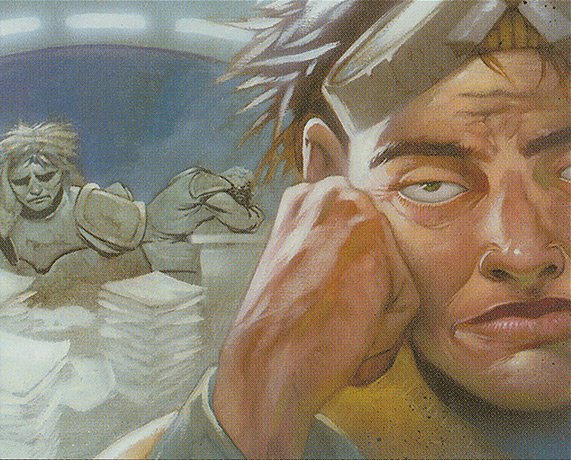
Fatigue by Jeff Miracola
At this point, nearly every take has been made. Nearly every Twitter or Reddit thread has been constructed, argued, and examined under a microscope. Of the two main sides in the Universes Beyond discussion, neither side has been successful in convincing the other to lay down their arms and agree.
But what if we didn’t need to have a winner here? What if we were better off by having people who believe differently about this?
Before we dive into this concept, let’s ground ourselves in reality. We’re discussing the identity and future of a fantasy card game made by a publicly-traded company. This is something where a competitive deck is based around a motorcycle-riding rat piloting a floating fortress, while sword-wielding angels circle around like seagulls around a garbage barge.
A wizard, a dragon, and a Time Lord walk into a bar. It turns out the people in the bar have a lot to say about the three of them together.
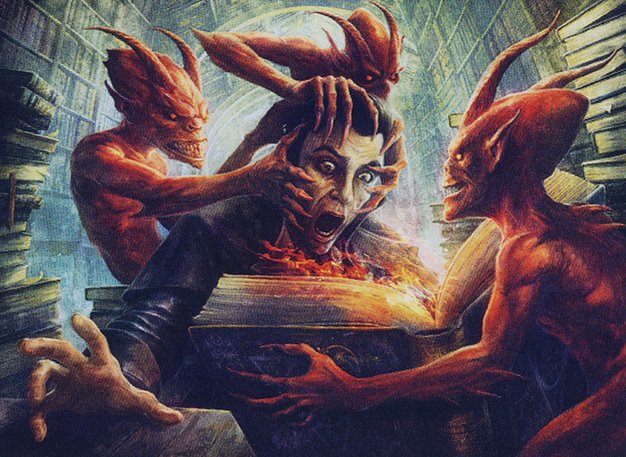
Infernal Tutor by Jason A. Engle
Why People Dislike Universes Beyond
For decades, Magic has meandered around a loosely-tied multiverse of sword and sorcery. Art, characters, and themes experience a general through line. It’s a complex visual history building an identity for players. Sure, there have been towering mechs, airships, and cyberpunk DJs, but to many players out there, Magic needs to feel like Magic. There’s something uninspiring about seeing Andrew Lincoln in a bomber jacket, arguing with someone out of view. The recent Doctor Who expansions brought cards like The Fourth Doctor, which is about as close as you can get to depicting an ordinary person you’d see at the DMV, but with a Magic stat block.
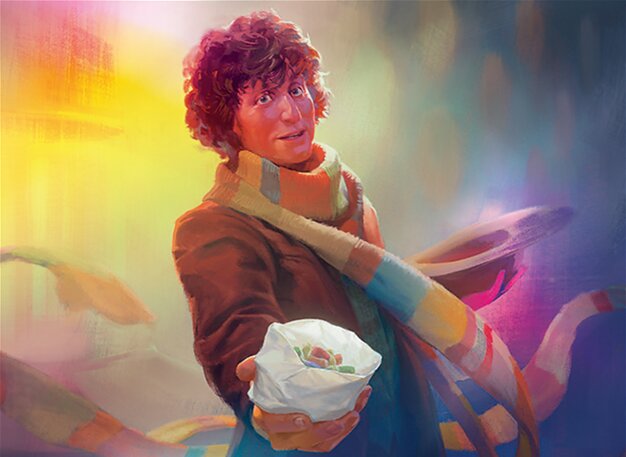
The Fourth Doctor by David Auden Nash
The new IP crossovers represent a slippery slope. If they continue to be successful, as they have been, what’s stopping us from seeing more? Will Magic eventually be a game of us commanding the Burger King riding a OneWheel into combat against Sheldon Cooper and the Smurfs?
Magic has caused people to spread roots. It’s given people lifelong friends, memories, and community. But could it be cast aside for the alluring nature of driving shareholder wealth through more crossovers?
Folks are worried about where we are, and where we’re going. For all the groundwork Magic has laid out over the past 30 years, it would be a shame to throw it all away like this.
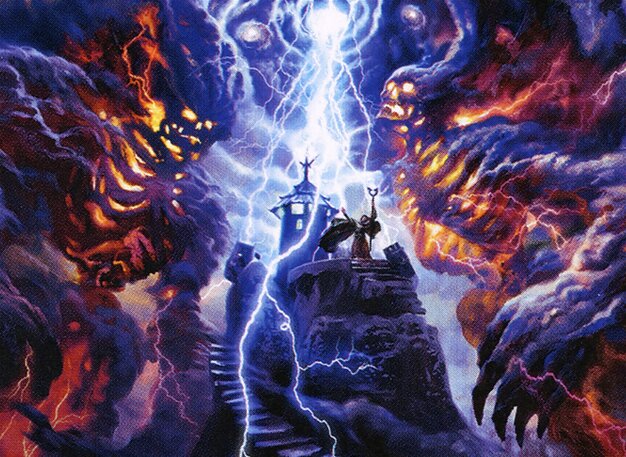
Seize the Storm by Deruchenko Alexander
Why People Like Universes Beyond
As I’ve written before, we’re more than Magic players; we’re people who play Magic. We have diverse backgrounds and varied interests. Sometimes these things intermix, like the Jund player with Liliana of the Veil altered to look like various X-Men characters. There’s a level of self-expression to be found in embracing things through the lens of Magic.
IP crossovers represent a level of imagination beyond what we’ve experienced in Magic. What if He-Man fought Nicol Bolas, or if goblins tried to pilot Wonder Woman’s invisible plane like how they do in the art for Battle Squadron? These kinds of scenarios, both on the battlefield and in the mind, are as wild as the reality of Magic’s flavor.
Bringing in new IPs allows Magic to expand in directions beyond the imagination of our sword and sorcery heritage. This can lead to new design space for game pieces, new mechanics being dreamed up, and an influx of new players.
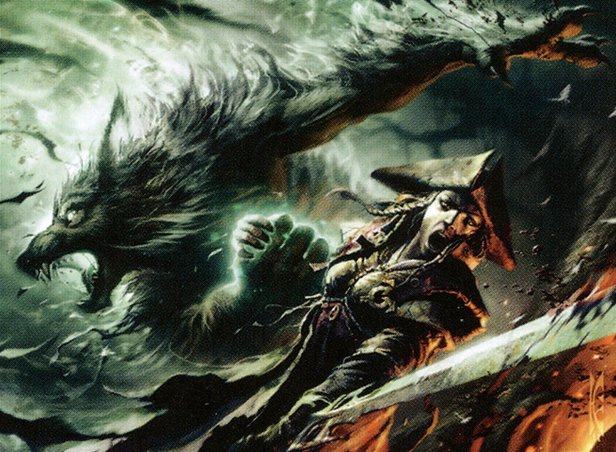
Joint Assault by Raymond Swanland
Why We Need Each Other
Universes Beyond isn’t going away, they’re far too successful. Knowing this, how we move forward together makes all the difference.
Compromise is a difficult topic these days. It’s often thrown into discussions where it shouldn’t be, in rambling op-eds written by people far removed from the issue they’re discussing. No, trans people shouldn’t be expected to compromise with those who believe they shouldn’t be allowed to exist. But for this fantasy card game we play for fun, we fans can work on a compromise. How you feel about Universes Beyond doesn’t need to be black and white, right or wrong. You can construct a feeling based on the many shades of grey in between.
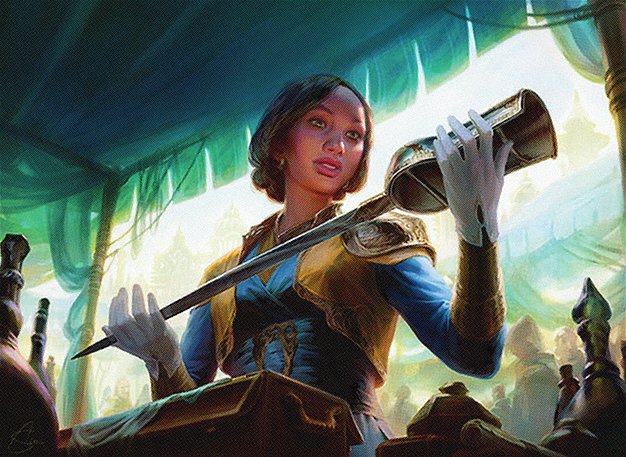
Trophy Mage by Anna Steinbauer
The future of Universes Beyond will likely fall somewhere between these two extremes. People vote with their wallets, and it’ll dictate our path forward. Some crossovers will succeed, others won’t. If the game becomes supersaturated with other IP’s, to the point of being unrecognizable, then sales and participation data will make its way back to Wizards of the Coast. Meanwhile, if player feedback is centered around the game feeling stale from a lack of visual or mechanical innovation, it’ll get back to Wizards too.
While not perfect by any stretch, Wizards is listening to what we have to say. Consumer sentiment is a difficult thing to understand, though. From a corporate perspective, think of it like the sound of a radio station crackling through the static. There are a lot of us out there, so trends have to be measured out from the noise. If you have a strongly held opinion about the game, odds are the three-minute, radio-friendly version is what comes out from the aggregate of players.
But we Magic fans can help each other, despite being so divided over this topic. Interest in Universes Beyond can drive more innovation in design from Magic R&D, as well as new players to support your local game store.
Folks who don’t like these products can keep us grounded in reality. Their resistance can keep Magic from spiraling into a convoluted mess of product placement. Their love for Magic’s history leads us to rich, flavorful, and mechanically sound sets. It’s how you get things like Dominaria or Kamigawa: Neon Dynasty.
Both sides can quietly benefit the other, despite being so publicly opposite.
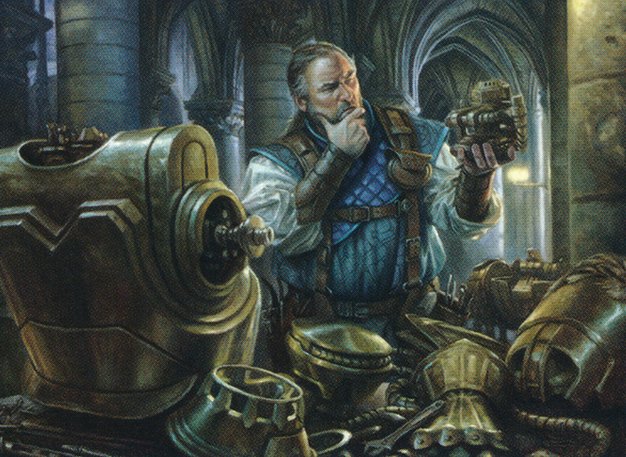
Sage of Lat-Nam by Matt Stewart
A Path Forward Together, Somehow
The more mechanically unique cards I see in Universes Beyond, the more I think of analogs to the car industry. Concept cars are used as exciting projects for designers, to hone skills for the things which actually hit the production line. While it’s not a full set, the Doctor Who cards might’ve been a project which lured a skilled game designer away from signing with another company. The design talent shown in small batch releases can be channeled into the bigger sets for the rest of us. For those reasons, I can understand why Universes Beyond have a place in our current landscape. Admittedly, it’s cool to have a Chaos Space Marine in my favorite Commander deck.
However, I worry about the allure of short-term cash grabs. They’re lovely for shareholders, but scary for the game I’ve loved since 1999. Playing games of Premodern or Old School reminds me of where we’ve come from, with cards which have stayed in our hearts for decades. It would be a shame for capitalism to ruin a good thing, but of course you could say that about anything. I always want Magic to feel like Magic, even though the identity ebbs and flows as years go by. Assassin’s Creed and Final Fantasy sound exciting, but Fallout and Doctor Who feel like too big a departure for me.
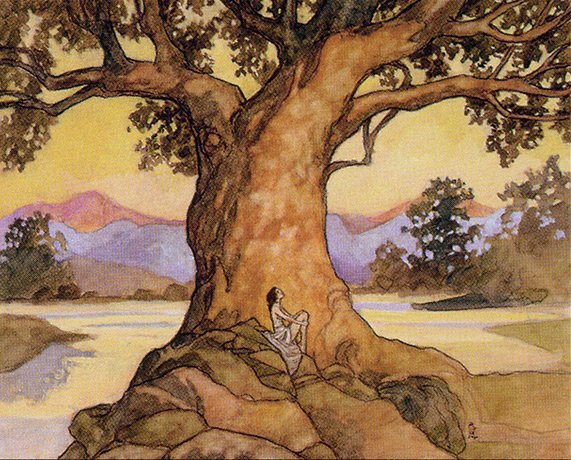
Moment’s Peace by Rebecca Guay
When it comes to Universes Beyond, I’m somewhere in between. My default is “cautiously optimistic”, but I’m one voice in a sea of others. Admittedly, all I need is a mountain bike ride in the woods or a smile from my baby son, and the stress over Magic’s future melts away. As with any hobby, having a diversity of other interests can help alleviate strain when the hobby isn’t in a good spot for you. This is especially relevant for a hobby tied to a publicly-traded company.
It’s okay if you want to see more of Universes Beyond, and it’s okay if you never want to see them again. They aren’t going away, but our combined feelings on the matter can help us navigate it together as a community. There’s a path forward, somewhere.
Travis Norman (he/him) is a writer and photographer from the wooded foothills of New York, currently living in the Upper Peninsula of Michigan. He’ll try any Magic format, but he has a special love for Legacy, Premodern, and Canadian Highlander. He has loved Magic since 1999, but champions having a healthy mental and financial relationship with the game. When not playing games, he enjoys cycling, tea, and dog parks. You can follow his exploits here on Instagram.

